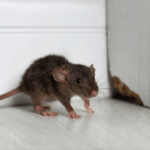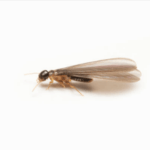One of the most prevalent types of pests found in homes, ants may become a major problem if not dealt with. These pests can be a major nuisance in every room of the house, from the kitchen to the pantry to the bedroom. Ants aren’t as innocuous as they look; they can spread disease, and they can even damage your home’s structure.
Luckily, ants may be managed in a variety of ways that will keep them from taking over your home. In this post, we’ll go through the best options for getting rid of ants at home, including DIY methods and paid exterminators. These suggestions will help you get rid of ants, whether you have a small problem or a major infestation.
Prevention Tips
Ants are a popular household pest, especially in warmer months, because they are gregarious insects that live in big colonies. Reducing the ants’ access to food and water and sealing off potential entry sites are two of the most effective preventative actions you can take against an ant infestation. Here are some things you can do to keep ants away:
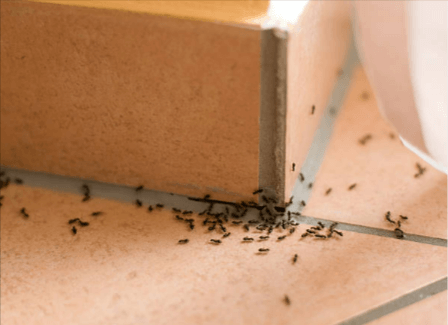
1. Identify Common Entry Points for Ants
Gaps around doors and windows, foundation splits, and plumbing penetrations are all potential access locations for ants. To keep ants out of your house, you should look for these cracks and crevices and cover them up.
2. Discuss Ways to Seal Up Entry Points
Seal cracks around windows and doors with silicone caulk or weather stripping. Cement or epoxy can be used to seal cracks in the foundation. Copper mesh or steel wool can be used to seal off holes in the wall around pipes and other access points. As a result, fewer ants will be able to enter your home in search of sustenance.
3. Focus on Kitchen and Pantry Cleanliness
The best way to prevent ant infestations is to eliminate all potential food and water sources from your home. Get rid of messes as soon as they happen, keep surfaces clean, and sweep the floor every day. Store goods in airtight containers and maintain an orderly pantry to keep ants at bay.
4. Promote Food Storage and Garbage Disposal
Food can be protected against ants if it is stored properly. Pets should be fed from sealed containers, and their plates should be submerged in a tray of water. Use a trash can with a lid and take it out on a regular basis to ensure appropriate disposal of garbage. To keep ants out of your compost bin, make sure the lid fits snugly.
5. Fix Leaks and Use a Dehumidifier to Reduce Home Dampness
Ants love damp places, so make sure yours is as dry as possible. Fix all the dripping faucets and leaking ceilings in your house. Reduce the amount of moisture in your home by using a dehumidifier in the basement or the bathroom.
Natural Remedies
It can be challenging to get rid of ants, a frequent household pest. Although there are many chemical options for ant control, some people would rather avoid potential health risks and adopt natural solutions. Listed below are some effective all-natural ant repellents:
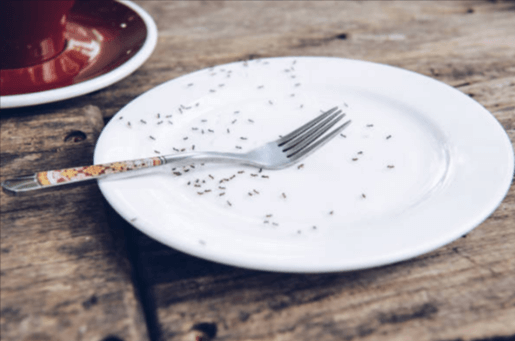
1. Natural Remedies
(a) Vinegar:
Vinegar’s natural insecticidal properties can help keep ants out of your house. Spray a solution of equal parts water and white vinegar along ant trails and access locations. Cleaning surfaces with undiluted vinegar can help prevent ants from returning because of the way its pungent smell covers up their traces.
(b) Baking soda:
Baking soda is a natural ant killer that works by preventing the ants’ digestive system from processing food. Sprinkle an equal amount of baking soda and powdered sugar in ant-infested regions. When the ants eat the sugar, they will also consume the baking soda and die.
(c) Essential oils:
Peppermint oil, tea tree oil, and citrus oil are just a few examples of the essential oils that have been shown to be effective insect deterrents. Spray a solution of your chosen essential oil and water along ant trails and potential entry locations. Cotton balls drenched with aromatic oils can be placed in ant-infested regions as well.
2. Effectiveness of These Remedies
It’s crucial to utilize these natural solutions properly and successfully if you want them to work for ant control.
- Using vinegar: Vinegar may be harmless in most cases, but it may cause damage to specific surfaces. Before applying vinegar to a large area, test it in a hidden spot. Avoid getting vinegar in your eyes or swallowing it because of its toxicity.
- Using baking soda: While baking soda is harmless in most cases, it can be scratchy on some surfaces. If you’re going to use baking soda, make sure to first test it in a hidden place. Baking soda is dangerous if ingested, therefore it’s also important to keep it out of your eyes and mouth.
- Using essential oils: It’s best to use essential oils in a well-ventilated location and keep them away from your skin and eyes to prevent irritation. Essential oils are highly concentrated, thus they should always be diluted before usage.
Chemical Treatments
One of the most frequent approaches to ant control in residential and commercial settings is the use of chemical treatments. Different chemical therapies have different potential advantages and disadvantages.
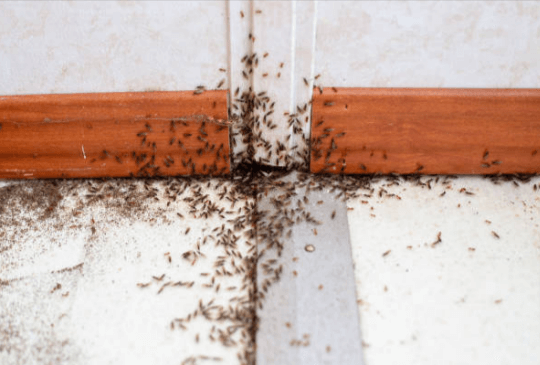
1. Baits
Ant baits are a common chemical treatment that work by attracting ants to a poison that they take back to their colony. The poison then spreads throughout the colony, eventually killing the entire colony. Baits are effective for controlling ant colonies and are generally considered to be safe for humans and pets.
2. Sprays
Contact killing is how ant sprays work. Although they can be useful in the short term, their effects on ant populations are temporary. Incorrect usage of certain ant sprays can be dangerous to humans and animals.
3. Dusts
Ant dusts are administered to affected regions in order to dehydrate and ultimately kill any ants that may be present. However, they are not always user-friendly and might make a mess when applied over a large area. Inappropriate usage of certain ant dusts has the potential to cause harm to humans and animals.
4. Insect Growth Regulators (IGRs)
IGRs are effective because they inhibit ants from maturing into reproducing adults by disrupting their development. They perform well in the long run to reduce ant populations, but they may take longer to take action than certain other chemical treatments. Insect growth regulators are assumed to be harmless for both people and their pets.
5. Benefits and Risks
When dealing with a serious ant infestation, chemical treatments can be quite successful. They are, however, not without their dangers. Some chemical treatments, if not handled appropriately, can be dangerous to humans and pets, and may also have effects on the environment.
It’s also worth noting that some ant species can acquire a resistance to chemical treatments, rendering them ineffective in the long run.
6. Using Chemical Treatments Safely and Effectively
It is crucial to strictly adhere to label instructions when utilizing chemical treatments for ant control. Keep children and pets away from treated areas and always use safety equipment such as gloves and a mask.
Always follow the manufacturer’s instructions and apply the remedy solely in the areas where ants have been spotted. It is important to properly dispose of any unused chemicals.
7. Seeking Professional Help
Consult a pest control expert if you have a serious ant infestation or if you are unsure how to utilize chemical treatments safely and successfully.
They are able to determine the severity of the infestation and provide advice on how to best eliminate the problem. They can also get safer and more effective chemical treatments not available to the general population.
Professional Treatments
Pros of Hiring a Pest Control Business
There are a number of advantages to hiring a professional pest control service to deal with ants:
- Experience and expertise: Expert pest control services can quickly and effectively diagnose and eliminate ant problems. Depending on the kind of ant and the severity of the infestation, they can administer customized therapies.
- Effective treatments: Expert pest control services can quickly and effectively diagnose and eliminate ant problems. Depending on the kind of ant and the severity of the infestation, they can administer customized therapies.
- Safety: Companies that specialize in pest management have employees who have been educated on the proper and safe application of pesticides. They can employ products with reduced toxicity to people and animals, and apply them in ways that reduce exposure.
- Time and convenience: By handling everything from inspection to treatment to follow-up, professional pest control companies are a huge time and stress saver for homeowners. Treatments can be scheduled at the homeowner’s convenience.
Different Types of Treatments That Professionals May Use
Pest control services may utilize a variety of methods, including but not limited to the following, to eliminate ant infestations:
- Insecticides: Sprays, baits, dusts, and granules are only some of the pesticides available to professionals for use against ants. Depending on the kind of ant and the geographical area of the infestation, they may employ a variety of pesticides.
- Non-chemical treatments: Professionals may employ chemical and non-chemical treatments alike to get rid of ants, including vacuuming, heat treatments, and exclusion techniques.
- Integrated Pest Management (IPM): Integrated Pest Management (IPM) is a strategy that uses a variety of techniques to eliminate pests such as ants. In integrated pest management, professionals can design a treatment plan that fits the homeowner’s unique requirements.
Selecting a Reliable and Experienced Pest Control Business
To guarantee the treatment’s success and safety, hire a pest control firm with a solid reputation in the industry. For effective ant control, homeowners should hire a business with the proper licensing and insurance, as well as relevant experience. You can trust this firm since it’s been recommended by people you know and trust.

